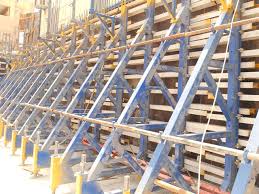Nov . 11, 2024 04:41 Back to list
Exporters of Formwork Systems for Concrete Slabs and Construction Solutions
The Significance of Formwork for Slabs in Construction An Insight for Exporters
In the construction industry, formwork is an essential temporary structure designed to support concrete until it hardens and gains sufficient strength. Among the various types of formwork, slab formwork stands out due to its pivotal role in creating flat concrete surfaces such as floors, ceilings, and roof slabs. With the global construction sector witnessing a surge in growth, the demand for formwork, especially for slabs, is on the rise. This article explores the significance of slab formwork, the trends influencing its export, and the key considerations for exporters.
Understanding Slab Formwork
Slab formwork consists of panels, braces, and supports that are assembled to create a mold for freshly poured concrete. It is designed to accommodate various slab depths, spans, and loads, ensuring the concrete maintains its required shape during curing. Traditionally, timber was the primary material used for formwork; however, advancements in technology have led to the development of more efficient materials such as aluminum, steel, and plastic. These modern alternatives are lighter, more durable, and often reusable, making them cost-effective solutions for contractors.
Growing Demand for Slab Formwork
The global construction industry has been expanding rapidly due to urbanization, infrastructure development, and increased investment in real estate. As a result, the demand for reliable and efficient slab formwork solutions is burgeoning. Emerging economies, in particular, are experiencing remarkable growth in construction activities, driving the need for innovative and high-quality formwork systems. According to industry reports, the slab formwork market is projected to grow significantly over the forecast period, bolstered by the expansion of public and private construction projects.
Trends Influencing Export Opportunities
1. Sustainable Construction Practices There is an increasing emphasis on sustainable construction methods. Exporters of slab formwork can capitalize on this trend by offering eco-friendly options, such as reusable formwork systems that minimize waste. Additionally, the use of materials that have lower environmental impacts will attract eco-conscious buyers.
2. Technological Advancements The integration of technology in construction is reshaping various processes, including formwork design and assembly. Exporters who embrace and promote technologically advanced slab formwork systems, such as those equipped with automated adjustments and real-time monitoring, are likely to gain a competitive edge in the international market.
3. Customization and Flexibility The diverse requirements of various construction projects necessitate customizable formwork solutions. Exporters who can provide tailored systems that cater to specific project needs will be better positioned to meet the demands of their clients.
formwork for slabs exporters

4. Shift to Modular Construction As modular construction gains popularity, slab formwork that can be easily adapted for different applications is becoming increasingly important. Exporters must focus on creating formwork solutions that are easily transportable, quick to assemble, and compatible with modular building techniques.
Key Considerations for Exporters
For businesses involved in the export of slab formwork, several factors must be considered to ensure success
- Quality Assurance Ensure that the formwork systems comply with international safety and quality standards. This will help build a reputation for reliability and encourage repeat business.
- Market Research Conduct thorough market research to understand the specific needs and preferences of potential clients in different regions. This information is crucial for tailoring products and marketing strategies accordingly.
- Logistics and Supply Chain Management Efficient logistics are vital to minimize costs and deliver products on time. Establishing strong relationships with reliable shipping partners is essential for maintaining a smooth supply chain.
- Regulatory Compliance Understand the regulations governing construction materials in target export markets to avoid legal issues and ensure acceptance of the products.
Conclusion
The demand for slab formwork is set to grow as the construction industry continues to expand globally. For exporters, there are significant opportunities to capitalize on this trend by offering innovative, sustainable, and customizable solutions. By focusing on quality, understanding market dynamics, and adhering to regulations, exporters can successfully navigate the complexities of the international market and contribute to the advancement of construction practices worldwide.
-
High-Quality U Head Jack Scaffolding – Reliable Scaffolding Jack Head Manufacturer & Factory
NewsJul.08,2025
-
High-Quality I Beam H20 Leading Timber Beam H20 Material Factory, Exporters & Manufacturers
NewsJul.08,2025
-
High-Quality Powder Coating Steel Formwork - Durable & Corrosion Resistant Solutions
NewsJul.07,2025
-
Inclined Column Formwork Supplier – Durable & Precise Solutions for Unique Structures
NewsJul.07,2025
-
High-Quality Water Stop Solutions Trusted Water Stop Company & Suppliers
NewsJul.07,2025
-
High-Quality Formwork Material Supplier Reliable Manufacturer & Factory Solutions
NewsJul.06,2025